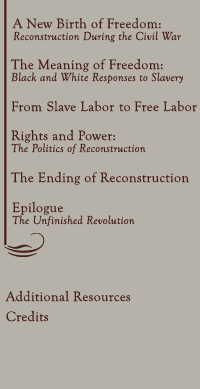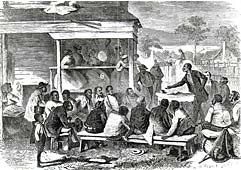




"Electioneering
at the South,"
Harper's Weekly, July 25, 1868.
Click image to enlarge.
Black suffrage was the most radical element of Congressional Reconstruction. In March 1867 - three years before the ratification of the 15th Amendment - Congress passed the Reconstruction Act of 1867, which extended the vote to black men.
It stated that the the states of the former Confederacy would only be readmitted to Congress after they ratified the 14th Amendment and accepted black suffrage. Richard Yates, a senator from Illinois, announced: "the ballot is the freedman's Moses."
Copyright
2003
